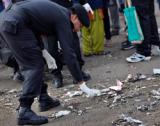Patna, Feb 23: Two days after the twin blasts in Hyderabad, an NIA team conducted raids in Bihar's Darbhanga and Samastipur districts to nab alleged operatives of the Indian Mujahideen (IM), officials said Saturday. 
State Home Secretary Amir Subhani said the state police will help the National Investigation Agency (NIA) team in its probe in the blast in the Andhra Pradesh capital Thursday evening that killed 16 people and injured over 100.
"The NIA team visits any place with solid evidence. The local police will help it," he told reporters here.
The NIA team is searching for Mohd Tahsim alias Monu, who is considered close to alleged Indian Mujahideen founder Yasin Bhatkal.
"A team of the NIA had conducted raids in Samastipur and Darbhanga in the last 24 hours in search of Mohd Tahsim alias Monu and other operatives of the Indian Mujahideen," a senior police official said.
Earlier, the NIA had issued arrest warrant against Tahsim alias Monu.
Banned militant outfit Indian Mujahideen's name has cropped up in the preliminary investigation into the twin blasts.
Last month, the NIA team had raided Maniari village in Samastipur district in search of him, but he was not found in his house.
The NIA team had arrested Mohammad Danish Ansari, an alleged operative of Indian Mujahideen from Chakjora village in Darbhanga in January 2013.
Ansari is allegedly a close associate of IM founder Yasin Bhatkal. Security agencies claim that Ansari provided shelter to Yasin Bhatkal in 2009 and 2010 in Bihar.





Comments
Add new comment